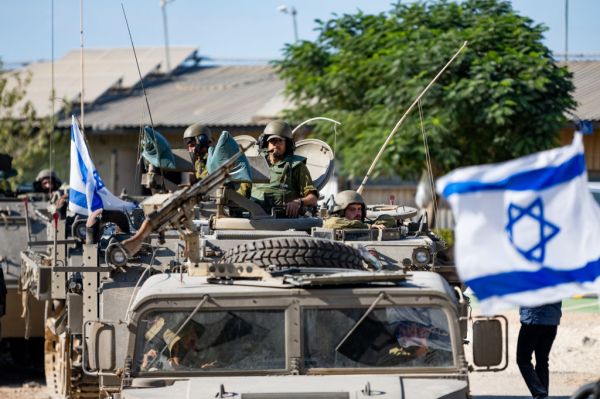For the second time in two years, America finds itself providing military support to a friend in the wake of aggression. Within days of Hamas’ attack on Israel, American munitions began flowing to the Israeli Defense Forces, and no reporting suggests that a single request for military material has yet been denied.
But the situation raises important questions: How long is such support materially sustainable given well-reported strains on defense supply chains? Even if Congress ultimately approves supplemental funding for military assistance to Ukraine and Israel, can the U.S. industrial base cash the checks? If so, what is the harm to the increasingly dangerous security situation in the Pacific—the only critical Eurasian region spared an open war at this moment—where China is testing American resolve in the South China Sea and preparing for a war over Taiwan?
In other words, are there enough guns, bullets, and bombs to sustain America’s global strategy, long underpinned by our status as the free world’s armory? Or will reality ultimately force us to retrench? The current polycrisis may be manageable for now, but the instrument panels for both our security abroad and our defense supply chains at home are flashing red—even without the United States engaged in combat.
First, the good news: The different nature of the wars in Ukraine and the Middle East, and the differences between both and a possible fight in the Pacific, means any trade-offs are limited and manageable. The new violence in the Middle East has not resulted in meaningful limitations on the Ukrainians or the Israelis.
In Gaza, Israel is in a largely urban fight, against a prepared but irregular enemy, and enjoys air supremacy. While the Russian-Ukrainian front line is 600 miles long and the shortest distance from the current frontline to the Sea of Azov is 60 miles, the entire Gaza strip is 25 miles in length and only 4 to 8 miles wide. Many critical Ukrainian needs—air power, long-range missiles, anti-armor capabilities—are not critical Israeli needs. Israel is instead churning through U.S.-produced air-dropped precision munitions and missile defense interceptors, which it needs not only to face current threats but in case of significant escalation in the north, where Hezbollah’s arsenal is much deadlier than Hamas’.
Israel indigenously produces numerous critical platforms and munitions that it does need on the ground, including tanks, artillery, and much of its own ammunition. Even in the unlikely scenario of a U.S.-supported or enabled Israeli strike on Iran, the kinds of systems that might be most useful to Israel—KC-46A air-to-air refueling tankers (purchased, but not yet delivered) or bunker buster bombs—are not especially relevant to Ukraine.
Israel and Ukraine are fighting mainly land and air wars, with real but less significant maritime components. A war in the Pacific, however, will be a naval war with a heavy aerial component and potentially significant ground engagements. If it comes, naval assets will be both targets and launch platforms for many of the weapons employed. The most acute needs in the Pacific would be for high-end systems designed to hit moving targets from long distances (and interceptors against Chinese equivalents) like the versatile Standard Missile 6, the Tomahawk cruise missile and its maritime strike variant, and the Long Range Anti-Ship Missile and Joint Air-to-Surface Standoff Missile.
That’s the good news. As of today, the outbreak of war in the Middle East has not created a crisis for munitions supply or America’s current strategy of arming partners in multiple regions.
But the fact that things are more or less manageable now does not mean that there are not grave reasons for concern. A war in the Middle East that metastasizes, with real losses for the IDF and direct American involvement, could strain U.S. supply chains, although in ways that are more likely to force tradeoffs between Ukraine and the Middle East than between either and the Pacific.
We are living in a new and much more dangerous world than the one in which our military operated for decades. One of us, during his military service, on numerous occasions called in high-end platforms like F/A-18s to engage in strafing runs against Taliban IED emplacers—small groups of men trying to kill Marines—carrying small arms, homemade explosives, and shovels. While satisfying in the moment, such incidents (which have been countless for American troops over the years) obviously relied on an overwhelming, almost comical mismatch in tactical resources between our troops and the enemy.
No one is laughing anymore.
In any direct great-power confrontation, resource limitations could turn into battlefield limitations with stalemate or defeat as possible outcomes. The mere possibility of our limitations weakens our deterrence—and yet, efforts to address the problem by washing our hands of security obligations in one theater to surge platforms and munitions to another will likely have terrible consequences of their own. A long line of policy errors since the end of the Cold War, namely the steady retrenchment of American forces from the European and Asian frontiers and significant reductions in our military capacity, have generated a grave and genuine dilemma.
We must plan for deterrence and, if necessary, victory. But how? In his recent speech promoting the major defense supplemental for Ukraine and Israel, Biden invoked FDR and how America was once the arsenal of democracy—and could be again. This is correct, but Biden’s policies don’t match his rhetoric, as even a cursory examination of Roosevelt’s record shows.
Roosevelt first spoke of the “arsenal of democracy” in December 1940, a full year before America went to war, but had been acting with urgency for years before. In January 1939, nearly three years prior to the Pearl Harbor attack, Roosevelt called on Congress to authorize $300 million (more than $6 billion today’s dollars) to triple the number of aircraft in the Air Corps to 6,000 planes. In a single swoop, Roosevelt had called for 50 percent more funds than the Air Corps had received in the preceding 14 years combined.
Following the German invasion of France in the spring of 1940, FDR called for the annual production of 50,000 planes. By 1944, with U.S. wartime production at its peak, we produced 96,000 planes in a single year. As FDR put it, “This means military implements—not on paper—which are ready and available to meet any lightning offensive against our American interest. It means also that facilities for production must be ready to turn out munitions and equipment at top speed.” By the war’s end, the U.S. had produced a total of 300,000 aircraft.
So it was with naval production. Roosevelt and Congress first passed the 1934 Naval Parity Act to build ships up to the treaty limits and modernize the Navy. Two years later, he passed the 1936 Naval Act that authorized the first construction of a battleship since 1921. In 1938, he passed the Second Vinson Act which authorized a 20 percent increase in the strength of the Navy. And following the fall of France in 1940, he passed the Two-Ocean Navy Act, an $8.5 billion (equivalent to $181 billion) appropriation that increased the strength of the Navy by 70 percent. Peacetime rearmament was responsible for 95 percent of the modern warships and 40 percent of the fleet before the Japanese attack at Pearl Harbor.
Roosevelt had the order right: Become the arsenal of democracy first (1934-1940), declare oneself the arsenal of democracy (end of 1940), and then enact the Lend-Lease Act (March 1941), in which the U.S. declared it would provide arms to the allies fighting the Nazis and Japanese free of charge. By December 9, 1940, when FDR said “I want to make it clear that it is the purpose of the nation to build now with all possible speed every machine, every arsenal, every factory that we need to manufacture our defense material,” it was a credible commitment to Allied power.
Biden, on the other hand, has it backward: He sought to cut defense spending while reactively supporting our allies by sending them arms.
It may seem radical, or at least premature, to compare America’s current strategic situation to that of the 1930s, but the parallels are striking. The Nazis, Mussolini’s fascist regime in Italy, and Imperial Japan’s militarist and expansionist ambitions formed an axis of instability. Their intentions were long clear and their salami-slicing approaches in Europe, Asia, and Africa meant that their initiation of World War Two was not the start, but just the latest military operation to defeat the Allied powers. The intentions of today’s Tripartite powers–China, Russia, and Iran–have similarly been clear for years and they too have modernized and massively expanded their military capacities while also invading, terrorizing, and coercing their neighbors.
How can Biden be more like Roosevelt? First, the United States must spend more, significantly more, on its defense. U.S. defense spending, as both a percentage of GDP and percentage of the federal budget, are at near-century-long lows. The situation is even worse when one looks at all the nondefense, noncore spending included in the defense budget. It is encouraging to see most Republican candidates pledge a significantly higher topline budget or material increases in naval capabilities. Increasing defense spending to Cold War-level like numbers would functionally mean a doubling of the defense budget, a feat last achieved by Ronald Reagan. To date, three Republican presidential candidates have pledged to raise defense spending as a percentage of GDP to at least 3.5 percent (Mike Pence), 4 percent (Vivek Ramaswamy), and 5 percent (Doug Burgum) and a fourth (Ron Desantis) has called for a four-oceans navy and a 30 percent increase in active warships during his time in office. If any of these pledges were enacted, these would represent a 15 percent to 60 percent increase in the topline and a serious down payment on what is needed.
Second, we must spend differently. We need to move away from a system in which short-term contracts take multiple years to manifest to one where longer-term contracts can be brought about more swiftly. There will be waste, but nothing compared to the cost of failing to deter—let alone losing—a war with another great power, or allowing our allies to collapse in the face of aggression. Appropriations or foreign sales resulting in multiyear contracts will result in investment in the supply chain and the reduction of choke points. Industry needs not just money, but the promise of future money, and that requires a profound change in attitude in the Pentagon and in Congress. Ukraine aid has helped catalyze this change, but much more needs to be done.
Third, we must spend now, before—not after—our production crisis limits our options. We cannot hit snooze on both the Ukrainian and Israeli alarms. As Benjamin Franklin once wrote, “An ounce of prevention is worth a pound of cure.” And while there are many difficult, structural restrictions on potential pace, America does retain major industrial capacity. Large supplemental appropriations for aid and defense, like the one currently being debated in Congress, are both critical for American forward defense, but will also further amplify the demand signal needed by industry to make the investments in jobs and infrastructure necessary.
The United States can continue to arm and support both Ukraine and Israel, and their success in those conflicts will bolster American security and deterrence. But, absent getting truly serious about our defense production capacity, success will be fleeting, and tough choices are ahead.








Please note that we at The Dispatch hold ourselves, our work, and our commenters to a higher standard than other places on the internet. We welcome comments that foster genuine debate or discussion—including comments critical of us or our work—but responses that include ad hominem attacks on fellow Dispatch members or are intended to stoke fear and anger may be moderated.